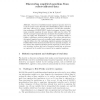Free Online Productivity Tools
i2Speak
i2Symbol
i2OCR
iTex2Img
iWeb2Print
iWeb2Shot
i2Type
iPdf2Split
iPdf2Merge
i2Bopomofo
i2Arabic
i2Style
i2Image
i2PDF
iLatex2Rtf
Sci2ools
71
Voted
ISMIS
1997
Springer
1997
Springer
Discovering Empirical Equations from Robot-Collected Data
Discovery of multidimensional empirical equations has been a task of systems such as BACON and FAHRENHEIT. When confronted with data collected in a robotic experiment, BACON-like generalization mechanism of FAHRENHEIT reached an impasse because it found many acceptable equations for some datasets while none for others. We describe an improved generalization mechanism that handles both problems. We apply that mechanism to a robot arm experiment similar to Galileo's experiments with the inclined plane. The system collected data, determined empirical error and eventually found empirical equations acceptable within error. By confronting empirical equations developed by FAHRENHEIT with theoretical models based on classical mechanics, we have shown that empirical equations provide superior t to data. Systematic deviations between data and a theoretical model hint at processes not captured by the model but accounted for in empirical equations. 1 Robotic experiment and challenges of real ...
Artificial Intelligence | Empirical Equations | Generalization Mechanism | ISMIS 1997 | Multidimensional Empirical Equations |
Related Content
| Added | 08 Aug 2010 |
| Updated | 08 Aug 2010 |
| Type | Conference |
| Year | 1997 |
| Where | ISMIS |
| Authors | Kuang-Ming Huang, Jan M. Zytkow |
Comments (0)

